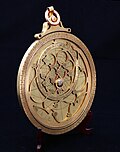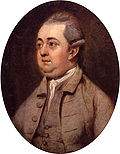Portal:History
The History Portal
History is the systematic study of the past, focusing primarily on the human past. As an academic discipline, it analyzes and interprets evidence to construct narratives about what happened and explain why it happened. Some theorists categorize history as a social science, while others see it as part of the humanities or consider it a hybrid discipline. Similar debates surround the purpose of history—for example, whether its main aim is theoretical, to uncover the truth, or practical, to learn lessons from the past. In a more general sense, the term history refers not to an academic field but to the past itself, times in the past, or to individual texts about the past.
Historical research relies on primary and secondary sources to reconstruct past events and validate interpretations. Source criticism is used to evaluate these sources, assessing their authenticity, content, and reliability. Historians integrate the perspectives of several individual sources to develop a coherent narrative. Different schools of thought, such as positivism, the Annales school, Marxism, and postmodernism, have distinct methodological approaches.
History is a broad discipline encompassing many branches. Some focus on specific time periods, such as ancient history, while others concentrate on particular geographic regions, such as the history of Africa. Thematic categorizations include political history, military history, social history, and economic history. Branches associated with specific research methods and sources include quantitative history, comparative history, and oral history.
History emerged as a field of inquiry in antiquity to replace myth-infused narratives, with influential early traditions originating in Greece, China, and later in the Islamic world. Historical writing evolved throughout the ages and became increasingly professional, particularly during the 19th century, when a rigorous methodology and various academic institutions were established. History is related to many fields, including historiography, philosophy, education, and politics. (Full article...)
Featured picture
Did you know (auto generated)

- ... that in the first Romanian universal chronicle, Mihail Moxa shows "the God of the Old and New Testaments baptizing His stars with the names of Olympian deities"?
- ... that Maggio di Accettura, a festival in Italy dedicated to the Christian martyr Saint Julian, might have pagan origins or be linked to Langobard history?
- ... that neurologist Christopher J. Boes has discussed the history of treating headaches without drugs?
- ... that the Chinese government began compiling an official history of the Qing dynasty in 2002, but as of 2023 a protracted political review is forestalling its publication?
- ... that the government of Victoria, Australia, has a program to remove 110 level crossings by 2030, the fastest rate in the state's history?
- ... that in 2023, car manufacturer Rivian acquired the historic Lynn Theatre in Laguna Beach, California, and converted it into its first showroom?
Emmeline Pankhurst (/ˈpæŋkhɜːrst/; née Goulden; 15 July 1858 – 14 June 1928) was a British political activist who organised the British suffragette movement and helped women to win in 1918 the right to vote in Great Britain and Ireland. In 1999, Time named her as one of the 100 Most Important People of the 20th Century, stating that "she shaped an idea of objects for our time" and "shook society into a new pattern from which there could be no going back". She was widely criticised for her militant tactics, and historians disagree about their effectiveness, but her work is recognised as a crucial element in achieving women's suffrage in the United Kingdom.
Born in the Moss Side district of Manchester to politically active parents, Pankhurst was introduced at the age of 16 to the women's suffrage movement. She founded and became involved with the Women's Franchise League, which advocated suffrage for both married and unmarried women. When that organisation broke apart, she tried to join the left-leaning Independent Labour Party through her friendship with socialist Keir Hardie but was initially refused membership by the local branch on account of her sex. While working as a Poor Law Guardian, she was shocked at the harsh conditions she encountered in Manchester's workhouses. (Full article...)
On this day
- 1775 – American Revolutionary War: Colonists Paul Revere and William Dawes, later joined by Samuel Prescott, began a midnight ride to warn residents of Lexington and Concord, Massachusetts, about the impending arrival of British troops.
- 1881 – The painted ceilings of the Natural History Museum, London, were unveiled when the building opened its doors to the public.
- 1915 – World War I: Hit by ground fire, French aviation pioneer Roland Garros (pictured) landed his aircraft behind enemy lines and was taken prisoner by German forces.
- 1949 – The Republic of Ireland Act 1948 came into force, describing Ireland as a republic and ending its membership in the Commonwealth of Nations.
- 1975 – Aryabhata, India's first satellite, was launched from Kapustin Yar in the Soviet Union.
- Ippolita Maria Sforza (b. 1445)
- Polydore Vergil (d. 1555)
- Jean Guillou (b. 1930)
- Albert Einstein (d. 1955)
Selected quote
What is the use of living, if it be not to strive for noble causes and to make this muddled world a better place for those who will live in it after we are gone?
— Winston Churchill, British statesman
Related portals
More Did you know...
- ... that the Japanese aircraft carrier Amagi (wreck pictured) capsized on 29 July 1945 as a result of cumulative damage inflicted by American airstrikes on 24 and 28 July?
- ... that Scandinavian influence in Scotland, still evident today, was probably at its height during the time of Thorfinn the Mighty?
- ... that, after the 2003 invasion of Iraq, the Bassetki statue, which is more than 4,200 years old, was found in a cesspool?
- ... that in medieval art, angels were often depicted wearing feather tights?
- ... that 49% of German military losses happened in the last 10 months of the Second World War in Europe?
- ... that Joshua L. Goldberg, the first rabbi to serve as a World War II U.S. navy chaplain, was a Russian army deserter?
- ... that Richard Nixon chose the Wilson desk as his Oval Office desk because he believed it was used by Woodrow Wilson, informed that it was used by Henry Wilson, Vice President under Ulysses S. Grant, but actually bought by Garret Augustus Hobart, 24th Vice President of the United States under President William McKinley?
- ... that some of the nominally silver Roman coins from the Bredon Hill Hoard only have a 1% silver content?
Topics
Categories

History • By period • By region • By topic • By ethnic group • Historiography • Archaeology • Books • Maps • Images • Magazines • Organizations • Fictional • Museums • Pseudohistory • Stubs • Timelines • Chronology • People • Wikipedia historians
WikiProjects
![]() WikiProject History •
Ancient Near East • Australian History • Classical Greece and Rome • Dacia • Former countries • History of Canada • Chinese history • European history • Heraldry and vexillology • Indian history • Jewish history • Medieval Scotland • Mesoamerica • Military history • Middle Ages • History of Science
WikiProject History •
Ancient Near East • Australian History • Classical Greece and Rome • Dacia • Former countries • History of Canada • Chinese history • European history • Heraldry and vexillology • Indian history • Jewish history • Medieval Scotland • Mesoamerica • Military history • Middle Ages • History of Science
WikiProject Time • Days of the Year • Years
WikiProject Biography • Composers • Political figures • Saints • United States Presidents
Things you can do
 |
Here are some tasks awaiting attention:
|
Associated Wikimedia
The following Wikimedia Foundation sister projects provide more on this subject:
-
Commons
Free media repository -
Wikibooks
Free textbooks and manuals -
Wikidata
Free knowledge base -
Wikinews
Free-content news -
Wikiquote
Collection of quotations -
Wikisource
Free-content library -
Wikiversity
Free learning tools -
Wiktionary
Dictionary and thesaurus


























































